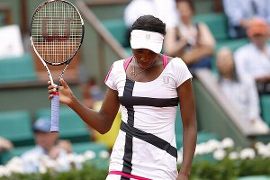|
PARIS -- Venus Williams explains that her life, these days, is about trying to have fun while playing tennis. She has no concrete expectations about the results, thanks to living with Sjogren's syndrome, a chronic and incurable autoimmune disease. She prays for the strength to be her best, never knowing what the answer will be until she steps onto the court. Unfortunately for Williams, a good attitude wasn't enough during Wednesday's second round of the French Open. She lost, in quiet and efficient fashion, to third-seeded Agnieszka Radwanska, 6-2, 6-3. Williams was having one of those days: feeling fatigued, not moving well. "I felt like I played," Williams said after her match. "I wasn't my best today. Yeah." She said there was no mental or emotional trick she could play to kick her game into a better gear. "I do the best I can," Williams said. "I don't have a magic answer. If I did, I'd be in the third round." It was the second day in a row a match on Court Philippe Chatrier ended in defeat for a Williams sister. Serena, who was seeded fifth, lost 4-6, 7-6 (5), 6-3 to unseeded Virginie Razzano of France on Tuesday. But these were two very different matches. Serena's three-hour match had fire, drama and tension before its bitter end. Venus slipped away against Radwanska somewhat passively, in less than an hour, like water down a drain. Venus joined a long list of American women who lost during Wednesday's second round. Ten Americans -- the most since 2003 -- made it out of the first round. The list of those remaining is now down to four as Melanie Oudin, Vania King, Alexa Glatch, Bethanie Mattek-Sands and Irina Falconi were soundly defeated in straight sets. Some serious, and seeded, clay-court players faced the mostly younger crew of Americans, who were not up to the task.  Oudin lost 6-2, 6-3, to No. 21 seed Sara Errani of Italy. Falconi was defeated by No. 6 seed Samantha Stosur of Australia, 6-1, 6-4. Glatch went down to No. 18 Flavia Pannetta of Italy, 6-3, 6-1. And King lost to No. 15 seed Dominika Cibulkova of Slovakia, 6-0, 6-2. The lone winner was Sloane Stephens, who advanced to the French Open's third round for the first time by defeating fellow American Mattek-Sands, 6-1, 6-1. Stephens, 19, showed a growing maturity with consistent groundstrokes that drew Mattek-Sands into 29 unforced errors. This is the second time Stephens has reached the third round in a Grand Slam. She also did it at the 2011 U.S Open. She will play Mathilde Johansson of France in the third round at Roland Garros. There will be one other U.S. woman guaranteed to advance, as Lauren Davis and Christina McHale play each other in the second round Thursday. American Varvara Lepchenko will also be in action, playing Jelena Jankovic. "[Advancing] is awesome," Stephens said in her still-bubby teen way. "I have to say I guess this is my second-favorite slam, because I guess the home slam [U.S. Open] would be my favorite slam. So I think making third round of my home slam and then of my favorite tournament [French Open], it feels really nice and I'm really excited." Despite the American corps being seriously thinned, and with the unexpectedly quick departures of the Williams sisters, Oudin said this French Open was a positive showing. Younger players like her, Glatch and Stephens looked at this tournament as a stepping-stone to build their confidence and experience. "I haven't really played people like her [Errani] in a while, because I have been off playing Challengers, and there is a big difference, especially on the red clay," said Oudin, 20. "I'm definitely playing better than I did last year. "It's definitely a step forward, which is good." The reality for Williams differs from that of the younger players. She is not trying to establish herself. Her path is about figuring out what she wants out of tennis at this point in her Hall of Fame career. She came to the French Open as a part of her quest to qualify for a fourth Olympics. Her ranking is No. 53, which should put her in the U.S. group of four women for the London Games. She said her probable spot on the team is a "victory" that made her brief appearance at the French Open worthwhile. Radwanska was a tough draw for the 31-year-old Williams at this stage in her career. Radwanska, 23, is a classic, speedy counterpuncher, absorbing Williams' pace and redirecting it. Rallies ensued, with Radwanska forcing Williams to continually hit another ball, which often ended in an unforced error. Radwanska, ranked No. 3 in the world, is known for grinding down opponents through her consistency and smart point construction. Radwanska committed six unforced errors. Williams had 33. Williams looked tired, and somewhat sad, as she sat in her chair during changeovers. Sometimes she stared, unfocused, into the stands. Other times she gazed at the ground, as if the red clay was going to reveal some fate-changing secrets. On the final changeover, she simply closed her eyes, as if deep in contemplation. Williams never seemed angry. She wasn't upset, either. She was just there. And then, after less than an hour, it was all over. "This is just the beginning for me," said Williams, smiling broadly. "This is a process that I have to learn a lot from, you know, working with myself, with my doctors, everything. Like this is the beginning for me again. I have to be positive. I can't walk out on the court and say, 'Oh, my God, this is it.' That's not the way I see it."
|
